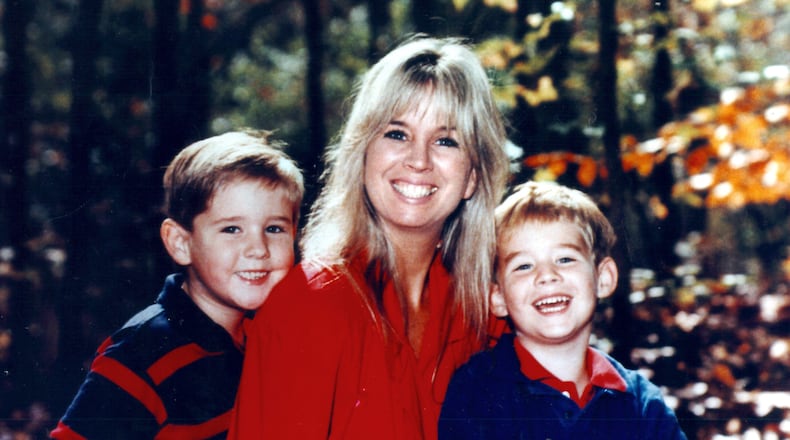Twenty years ago, Fred Tokars destroyed his family and turned Atlanta upside down when he had his wife shot to death in front of his two young sons.
The sensational case dominated the headlines in 1992 and electrified Atlanta’s legal community: Tokars was a high-profile attorney who was a fixture inside the courtroom and a recognizable name outside of it, thanks to advertisements peddling his legal skills.
After his 1993 arrest, Tokars’ sons moved to Florida to live with relatives, never to speak with their father again. Tokars went to the bowels of the federal prison system, a marked man because he started his legal career as a prosecutor and part-time judge.
Now, prosecutors say Tokars has deliberately, even courageously, acted to rewrite the end of his sordid story.
Over the last decade, Tokars has helped solve six murders, providing testimony that sent one man to death row and another to prison for life. Tokars, said one prosecutor, testified so his sons would one day learn he was capable of good.
“One of the reasons Fred said he did this was to leave a good legacy for his children,” said Noel Levy, an ex-Marine and retired Arizona prosecutor who, with Tokars as his star witness, convicted a man named Robert Ortloff in 2008, for the 1984 murder of a young woman.
“He was critical to the prosecution,” said Levy. “If it wasn’t for him, that cold case wouldn’t have been filed.”
Four years earlier, in Iowa, Tokars’ testimony helped send Dustin Lee Honken to death row. Honken, a large-scale methamphetamine manufacturer, was convicted of two separate killings of men who he feared would testify against him. One of those crimes was the nightmarish killings of a drug-dealing partner, that man’s girlfriend and her two young children.
Honken, a vicious psychopath, justified killing the kids because “they were rats being raised by rats.”
Credit: Dwight Ross Jr., AJC file
Credit: Dwight Ross Jr., AJC file
Today, Tokars’ exact location is a closely guarded secret. He is in the federal government’s witness protection program and his name has been expunged from the prison database.
He lives alone in a cell where he watches cable TV, reads the Wall Street Journal to keep up with current events and sometimes calls friends to reminisce on good times from long ago, according to one friend who has stayed in touch with him.
He has become an observant Jew and his hair is said to be long, as is his beard. He is confined to a wheelchair due to a mysterious neurological disorder and spinal problems. Tokars, 59, also longs to re-connect with his two sons. Not surprisingly, they grew up resenting him.
A double life
Tokars landed in prison because he worried his wife would reveal his double life as a kind of consigliere to Atlanta drug lords.
On on Nov. 29, 1992, Sara Tokars walked into her Cobb County home after driving back from Florida with her two young sons. She was immediately confronted by a shotgun-wielding man who ordered the family back into her car. A few miles away, the man ordered her to pull over and then fired a shot point blank into her head.
Six-year-old Ricky Tokars reached across his mother’s body, turned off the engine, grabbed his 4-year-old brother, Michael, by the hand and then ran across a field to a house with lights on.
The killing of a beautiful blond woman from an upscale suburban neighborhood in front of her two small boys fueled a media frenzy. Her husband was a lawyer who advertised on TV and had political connections in high places. The morning after the killing, a state Supreme Court judge who was a friend hugged the grieving Tokars in the driveway of his home as news crews arrived.
But soon, it became apparent Tokars had a secret life filled with a host of unsavory characters. He represented drug dealers and helped them incorporate businesses that hid their earnings. Tokars was arrested after one of his business partners, Eddie Lawrence, told police Fred had him hire a hit man to kill his wife because he feared Sara would go the police with his secrets.
Tokars was convicted in federal court in 1994 of racketeering charges and was sentenced to life in prison without parole. Three years later, he sobbed with relief after a jury convicted him of the state murder charges but failed to give him the death penalty.
But Tokars’ twisted belief that he had to silence his wife to save his own skin, a prominent detail in his trials, was to become a key reason other convicts were willing to unburden secrets of their own.
Witness for the prosecution
After his second conviction, Tokars went to the U.S. Penitentiary in Florence, Colo., the high-security facility. It was there he met Honken, who had been convicted on a meth distribution charge. Honken asked the former lawyer to help him appeal his case.
Tokars, in a later interview with an investigator, said Florence was a dangerous place where prisoner attacks were frequent. He was no stranger to prison violence; he once was attacked with a Molotov cocktail in another prison. Despite the danger, prisoners in Florence looked up to him, he said.
“They know I got a life sentence, they know I didn’t testify against anybody. They know I’m not a rat,” Tokars told the detective. “People think I’m a stand-up guy on the one side, who’d be willing to kill a witness. But then on the other side, they’d like to kill me because I’m a former prosecutor or a judge.”
Honken was insistent Tokars help him. Honken was impressed that Tokars was convicted of killing his wife, who was a potential witness. During more than 100 conversations over several months, Tokars said Honken bragged to him about beating an earlier meth distribution case by eliminating his witnesses. During those conversations, Tokars later testified, Honken spelled out details of the murders, even describing his victims’ shallow graves.
Honken’s attorney, Alfredo Parrish, said Tokars talked about his own wife’s murder to draw information from his client. Parrish repeatedly asked Tokars to admit he had his wife killed. “It goes to his candor as a witness,” Parrish told the judge.
Repeatedly, Tokars evaded question.
“Are you telling us, Mr. Tokars, that you were convicted of something you didn’t do?” an exacerbated Parrish asked.
“I was convicted,” said Tokars, a response he gave time after time.
The judge never demanded that Tokars answer the question.
In 1999, Tokars was transferred to a prison in Wisconsin, where he immediately met Robert Ortloff, who was convicted of a mail bombing and had been long suspected of a 1984 murder. Ortloff knew of Tokars’ past and urged him to help appeal the bombing case, Tokars said.
Ortloff claimed he was convicted in the bombing case because authorities couldn’t get him on the murder. Tokars said he discovered that Ortloff lied to him several times and demanded he be honest with him. Then, Tokars said, Ortoff admitted he killed the woman. Tokars said Ortloff confided in him because he felt a kinship, because Tokars was convicted of killing his wife.
Levy, the prosecutor, said Tokars simply outsmarted an inmate “who thought he was bulletproof.”
Tokars made a fine witness who was unrattled during cross-examination, Levy said. “He displayed an inner strength,” he said. “His voice never weakened. Not only was he sincere but he was persuasive.”
Tokars may have been persuasive, but not everyone saw him as sincere. One juror called Tokars “a real creepy crawler.”
Paul Rubin, a private detective who covered the trial when he was a journalist, said Tokars manipulated Ortloff. “Fred was masterful in seducing Ortloff,” said Rubin. “Ortloff was a fine jailhouse lawyer himself but Tokars convinced him he needed help. He spun a great web and Ortloff fell right into it. I have no doubt if he has access to other prisoners, he’ll turn out more snitch cases.”
Resigned to life in prison
Alan Bell, who is Tokars’ best friend, said Tokars is rarely in contact with other prisoners and won’t testify again. Bell, who attended the University of Miami with Tokars, still talks with his old friend, making small talk about their alma mater’s football team, “the good old times” or maybe even current events.
He said Tokars has not asked for any benefits from his testimony. It is difficult to know if he received anything. Tokars is not listed in the Bureau of Prisons roster of prisoners. A BOP spokesman said he doesn’t have the clearance to know where Tokars is being held. Neither his defense attorney in Atlanta, Jerry Froelich, nor his prosecutor, Buddy Parker, know where he is. Bell said all he knows is Tokars told him it gets cold during winters in his cell.
Rick Tokars is 26, and Mike is 24. In an on-line posting, Mike complained his family can get no information about his father.
Tokars’ sons were raised in Bradenton, Fla., by Sara’s parents and sisters. Rick went to San Diego State University and lives in California, studying to be a paramedic. Mike lives in New York and wants to become a journalist.
Bell said Tokars has written to his sons several times but has gotten no response. Sara Tokars’ family said the boys never received any letters from their father.
Bell said Tokars is also resigned he will die in prison.
“He knows he’ll probably never get out,” said Bell. “He’s beaten up and ill. Life hasn’t gone his way. He’s hopeful, but not expectant.”
About the Author
Keep Reading
The Latest
Featured




